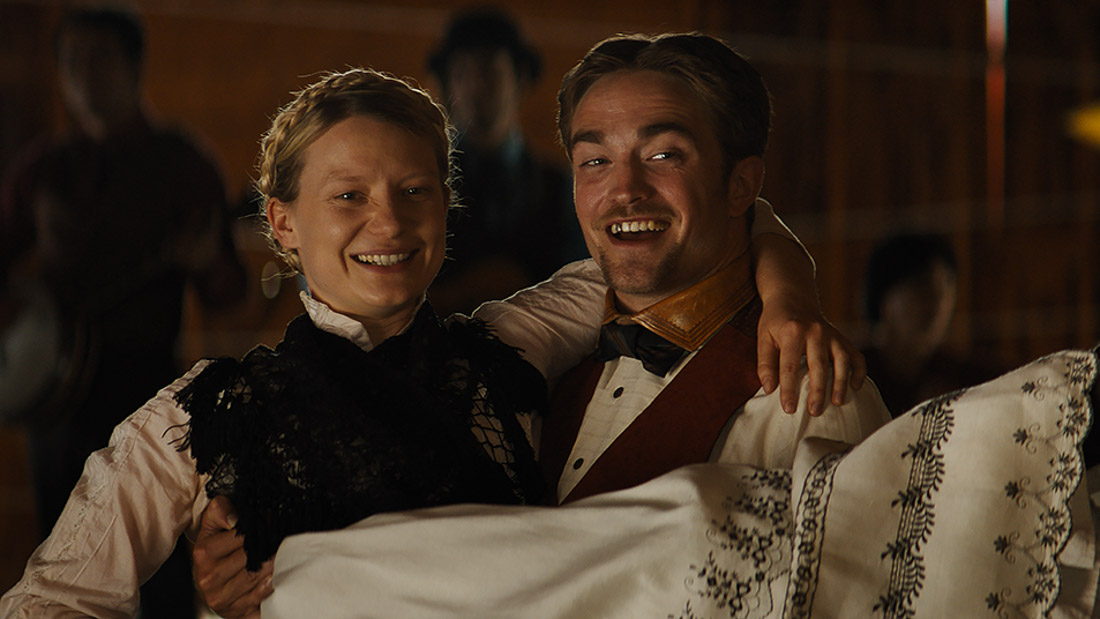Three films spotlighted by the Premieres category of the Sundance 2018 Film Festival brought A-list talent Park City this year, delivering artistically to different degrees. Like all of the best Sundance programs, Premieres allows for a wide array of filmmaking styles and storytelling. This trio has almost nothing in common other than being a little too high-budget in all likelihood for U.S. Dramatic Competition (which has a low budget maximum). Premieres last year included “The Big Sick” and “Mudbound,” but nothing has really sparked audiences in Park City to the same degree this year. And, while two of these movies succeed to varying degrees, none of them will either.
David and Nathan Zellner have their own idiosyncratic style, as evidenced by their work on Sundance Comp hit “Kumiko, the Treasure Hunter.” With “Damsel,” the Zellners turn that style to the tropes of the Western, trying to subvert them in a tone that recalls everything from Mel Brooks to Wes Anderson. It’s a delicately made film with some totally committed performances, but it sags a bit in the middle while it spins its wheels, looking for something else to do. Still, there’s a lot to like here, particularly in the way the Zellners’ defy genre tropes and how much their stars are willing to go along with their singular style.
One of the problems with “Damsel” is that it opens with arguably its best scene. A man credited only as “Old Preacher” sits on a bench in the middle of nowhere, waiting for a stagecoach that appears to never come. The irascible man of the cloth is played by the one-and-only Robert Forster, capturing in this movie’s opening virtual homage to “Waiting for Godot” the miserable nature of this desolate part of the world. He speaks to another man named Henry (David Zellner himself) about how awful it is to be in the old West, and the two are quite literally headed in different directions. Before long, the old man gives up on waiting, casting off his clothes to Henry, and walking off into the barren landscape for the Lord to take him. Henry becomes the new Parson.
As the lighthearted credits unfold over a dance sequence, we meet the heroes of this story: Samuel Alabaster and his damsel Penelope, played by Robert Pattinson and Mia Wasikowska, both perfect for the Old West milieu. Pattinson’s Samuel is a wide-eyed, goofy dreamer, the kind of guy who sips his whiskey shot in the bar because of his upset stomach and walks around with a miniature horse named Butterscotch. The tiny pony is a wedding gift for Penelope, but she’s been absconded by a ne’er-do-well known as Anton Cornell. Samuel has hired Parson Henry to go with him to save Penelope and then marry the damsel and her savior. If you’re guessing that the proceedings won’t go quite that smoothly, you’re on the same page as the Zellners.
Like a quirkier cousin of past Sundance hit “Slow West,” “Damsel” isn’t a traditional Western, most subversive in the way it undermines its very title. Without spoiling anything, Penelope isn’t exactly in distress, and the best thing about the Zellners’ script narratively is the way it challenges the concept of a woman practically being a possession back then. Everyone assumes Penelope will do exactly what they want her to do. And she’s having none of it, an element perfectly captured in a fiery performance from Wasikowska, who fits in any period but looks particularly at home here. Pattinson, who has been on a roll lately with “The Lost City of Z” and “Good Time,” takes a left turn from his typical style here, revealing how much he can do comedy as well as drama. The leads are the best thing about “Damsel.”
Sadly, there are too many scenes in “Damsel” that feel overly precious in the Zellner tone. You keep wanting the movie to pick up the pace, which is essential for comedy. Imagine the slow pace of a Western, but bursting into comedy sequences instead of gunfire (although there’s some of that as well). “Damsel” is a good film, particularly because of its acting and originality, but falls short of greatness. It’s a movie of moments instead of a cohesive experience, the kind of thing you may enjoy at home in a few months but would likely disappoint you in a theater.

Far more broad-reaching in its demographic appeal is Marc Turteltaub’s “Puzzle,” an unexpectedly solid domestic drama about a woman who discovers a previously-unknown talent, and sees that ability open up the entire world to her. This is a film that critics will call predictable and clichéd, but the performances transcend the film’s tropes, grounding it in characters that feel more complete than this subgenre often produces. Sorry for the obvious allegory, but even if every piece doesn’t click into place here, you can still see the quality of the overall picture.
The great Kelly Macdonald plays Agnes, the protagonist of what is basically a character study by writer Oren Moverman (“The Messenger”) from a Brazilian film called “Rompecabazas.” Agnes is an ordinary housewife, comfortable in her routine in her Ipswich home. She has two sons and a mechanic husband named Louie (David Denman of “The Office,” doing good work with his biggest part to date), but Turtletaub establishes her daily dynamic early—she counts down to her alarm going off, knows what her husband will say every morning, and manages a relatively happy home, although there are signs that this domesticity is built on a leaky foundation.
Then Agnes gets a puzzle for her birthday. She pops it open during one of her few breaks from maintaining her home life—she cooks dinner every night, for example—and quickly puts together all 1,000 pieces. Then she takes it apart and does it again. Realizing instantly that she has a unique skill set, she travels into Manhattan to get more puzzles, stumbling upon a flyer looking for a puzzle competition partner. This brings her into the world of Robert (the charming Irrfan Khan), a wealthy puzzle king looking for a doubles partner. He instantly sees the potential, and not only in Agnes’ ability to put pieces together. He sees her for the funny, smart, beautiful person she hasn’t been able to express to too many people. And then things get complicated.
The unfulfilled potential of the American housewife has been a cinematic theme for decades and so one can’t really give “Puzzle” credit for breaking too much ground, but it handles the well-trod paths it travels with likability and genuine warmth. We come to like Agnes and Robert, and Moverman even refuses to turn Agnes’ husband into a traditional villain. He’s actually something of a sympathetic character in that he’s become so accustomed to his wife’s routine that he is emotionally devastated when it changes. Should a man expect his wife to buy his specific Manchego cheese every week? Probably not, but when someone grows used to something, it’s understandable when the break in pattern shatters them. The puzzle analogy—Agnes and Robert love them because they allow perfection in having all the pieces fitting, which doesn’t happy in life—gets a little stressed by the script, and feels like a crutch sometimes, but what I like most about “Puzzle” is how it gets away from its competitive angle to capture how winning doesn’t really matter to Agnes as much as finally getting to express herself. It’s putting the puzzle of life together that’s exciting, not the final picture.

Which brings to “The Happy Prince,” an Oscar Wilde biopic that marks the grand return of Rupert Everett to the big screen, writing, directing, and starring as the legendary writer in this project. The kind thing to say would be that the triple-duty diffused Everett’s talents, since he falters in all three arenas, but Wilde himself would probably say something much cattier.
Everett chose to focus on the last three years of Wilde’s life, the tragic chapters after his incarceration and exile to France. That means that one of the wittiest writers in history is captured in something of a dirge, a gloomy drama about betrayal, loss, and death. After being released from prison with hard labor, Wilde fled to France, running from his family (including an estranged wife played by Emily Watson) and his lover, Bosie Douglas (Colin Morgan), the main reason he was incarcerated in the first place. Stuck across the pond, Wilde dreams of returning to the elements of life he knew—fame, marriage, love—but begins to realize the impossibility of ever doing so. Colin Firth and Tom Wilkinson co-star.
None of “The Happy Prince” is allowed to breathe, with Everett the writer alternating between dialogue that sounds over-written and a narrative that’s almost defiantly under-cooked. The result is a film that never connects with the audience—we’re watching this literary legend through a depressing filter that doesn’t even allow the emotion to register. It all becomes a bizarre exercise in period filmmaking that mistakes production values and costumes for believability—and even those elements don’t feel real here. It’s what I call a “dress-up movie” in that you’re constantly being reminded of the attempts at period recreation instead of being carried away by the story. There’s nothing happy here.












